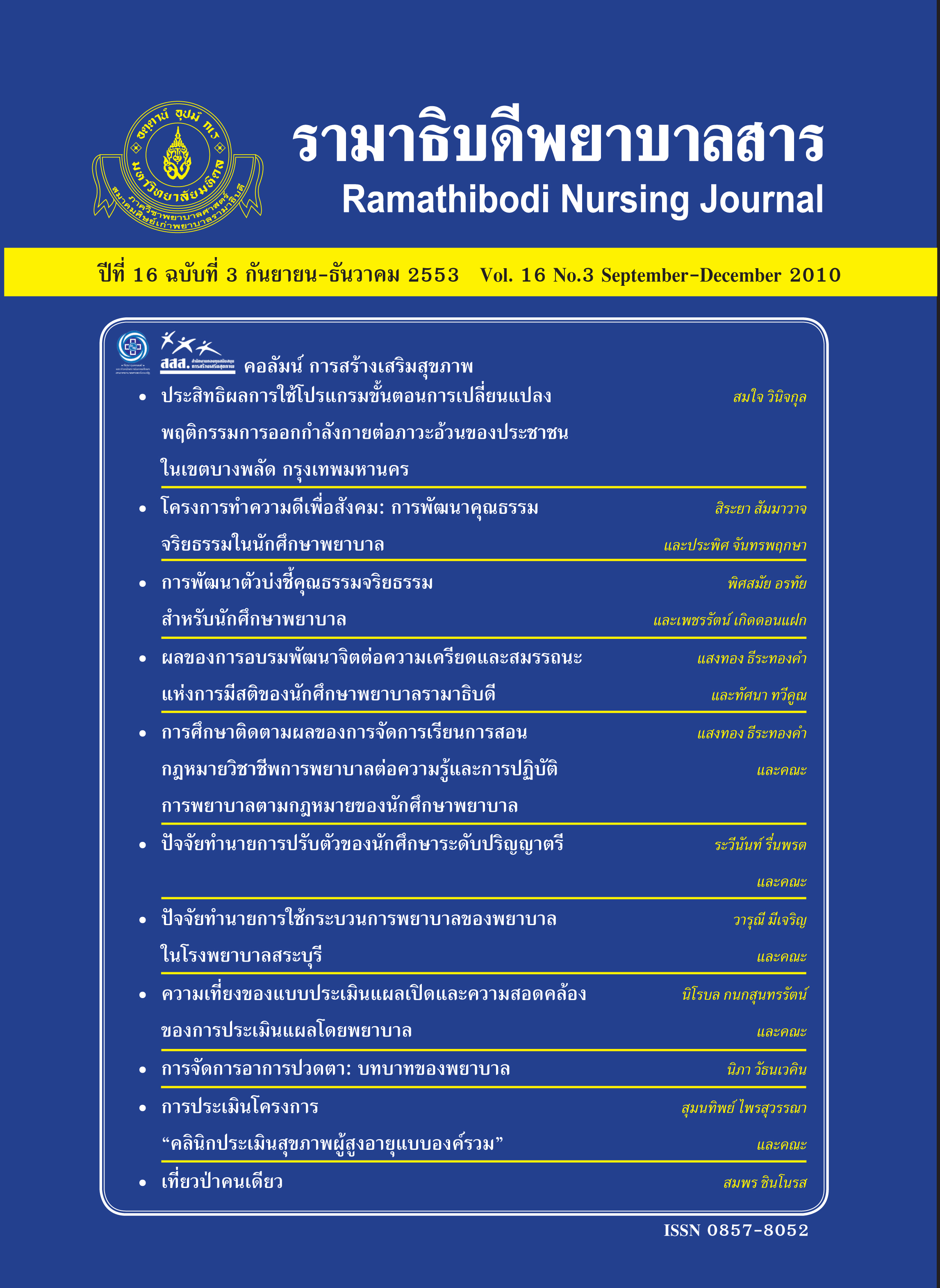ผลของการอบรมพัฒนาจิตต่อความเครียดและสมรรถนะแห่งการมีสติของ นักศึกษาพยาบาลรามาธิบดี
Main Article Content
Abstract
บทคัดย่อ
การศึกษาครั้งนี้เป็นการวิจัยกึ่งทดลองเพื่อศึกษาผลของโปรแกรมการอบรมพัฒนาจิตต่อการรับรู้ความเครียดและสมรรถนะแห่งการมีสติในนักศึกษาพยาบาลรามาธิบดี กลุ่มตัวอย่างคือนักศึกษาพยาบาลรามาธิบดีชั้นปีที่ 2 ปีการศึกษา 2550 จำนวน 115 คน ซึ่งได้เข้ารับการอบรมพัฒนาจิต ณ ยุวพุทธิกสมาคมแห่งประเทศไทย กรุงเทพมหานคร เป็นเวลา 8 วัน 7 คืน และตอบแบบสอบถามครบถ้วน เก็บรวบรวมข้อมูลโดยใช้แบบวัดการรับรู้ความเครียดและแบบวัดสมรรถนะแห่งการมีสติ วิเคราะห์ข้อมูลด้วยสถิติบรรยายและการวิเคราะห์ความแปรปรวนแบบวัดซ้ำ ผลการศึกษาพบว่าก่อนการอบรมพัฒนาจิต กลุ่มตัวอย่างส่วนใหญ่มีการรับรู้ความเครียดและสมรรถนะแห่งการมีสติ อยู่ในระดับปานกลาง ภายหลังการอบรมพัฒนาจิต 1 สัปดาห์ และหลังการอบรม 4 เดือน คะแนนเฉลี่ยการรับรู้ความเครียดลดลงและสมรรถนะแห่งการมีสติมากกว่าก่อนการอบรมอย่างมีนัยสำคัญทางสถิติ อย่างไรก็ตาม หลังการอบรม 4 เดือนกลุ่มตัวอย่างมีคะแนนเฉลี่ยการรับรู้ความเครียดเพิ่มขึ้น และสมรรถนะแห่งการมีสติลดลงเมื่อเทียบกับหลังการอบรม 1 สัปดาห์อย่างมีนัยสำคัญทางสถิติ ดังนั้น ผลการวิจัยชี้ให้เห็นว่าโปรแกรมการอบรมพัฒนาจิตช่วยลดความเครียดและเพิ่มสมรรถนะแห่งการมีสติของนักศึกษาพยาบาลสถาบันการศึกษาพยาบาลควรจัดการอบรมพัฒนาจิตในหลักสูตรพยาบาลศาสตร์และควรมีการฝึกสมาธิอย่างต่อเนื่องตลอดการศึกษา
คำสำคัญ : การอบรมพัฒนาจิต, ความเครียด, สมรรถนะแห่งการมีสติ, นักศึกษาพยาบาล
Abstract
The quasi-experimental design was carried out to examine the effect ofthe Mental Development Program on perceived stress and meditation efficacy ofRamathibodi Nursing Students. The sample was the second year nursing Studentsat Ramathibodi School of Nursing in academic year 2007. One hundred and fifteennursing students attended the Mental Development Program held at the Young BuddhistsAssociation of Thailand for 8 days and 7 nights, and completed questionnaires. Datawere collected using the Perceived Stress Scale and the Meditation Efficacy Scale, andanalyzed using descriptive statistics and repeated measures ANOVA. The resultedrevealed that before the Mental Development Program, participants had moderate bothperceived stress and meditation efficacy. After the Mental Development Program at1 week and at 4 months, the participants showed significantly decrease in perceivedstress and increase in meditation efficacy as compared to before the program. However,after the intervention at 4 months, perceived stress was significantly higher, whilemeditation efficacy was significantly lower than those after intervention at 1 week.Therefore, the results point out that the Mental Development Program assists to reduceperceived stress and improve concentration of nursing students. The nursing institutesshould integrate the Mental Development Program in the nursing curriculum andprovide the meditation practice program throughout their study.
Keywords : Mental development program, Stress, Meditation efficacy, Nursing students
Article Details
บทความ ข้อมูล เนื้อหา รูปภาพ ฯลฯ ที่ได้รับการตีพิมพ์ในรามาธิบดีพยาบาลสาร ถือเป็นลิขสิทธิ์ของวารสาร หากบุคคลหรือหน่วยงานใดต้องการนำทั้งหมดหรือส่วนหนึ่งส่วนใดไปเผยแพร่หรือเพื่อกระทำการใด ใด จะต้องได้รับอนุญาตเป็นลายลักษณ์อักษรจากรามาธิบดีพยาบาลสารก่อนเท่านั้น


